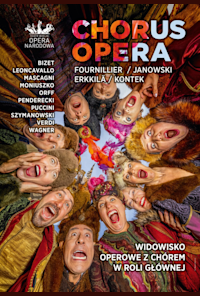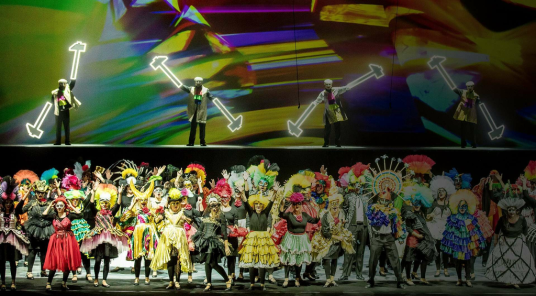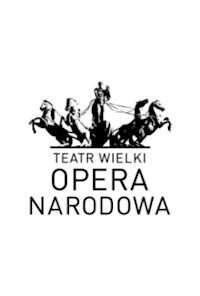In 2020 the Polish National Opera celebrated 55 years since the reconstruction and reopening of its historical building in Teatralny Square in Warsaw. The ambitious project of rebuilding the opera house from ruins had been brought to a conclusion twenty years after the war. The revamped opera house officially opened on 19 November 1965. Soon after, the company moved into its new home from a temporary venue in Nowogrodzka Street.
The reopening of the Teatr Wielki gave new impetus to the development of the company. Productions shown on the enormous stage needed a mighty chorus. The ensemble soon earned the reputation of being one of the best of its kind in Poland, mostly thanks to the outstanding vocal skills of its members and their excellent ability to sing together. Over the years, a string of chorus masters dedicated themselves to maintaining high musical standards in the ensemble. They were Józef Bok, Zofia Urbanyi-Świrska, Henryk Wojnarowski, Lech Gorywoda, Jan Szyrocki, and Bogdan Gola. Since the 2016/2017 season, the chorus is led by Mirosław Janowski. The ensemble performs in opera productions, symphony concerts, and has its own concert schedule.
The chorus’s prowess prompted prominent French conductor Patrick Fournillier, who has been the Polish National Opera’s artistic director since the 2022/2021 season, to mount a show starring the chorus in the leading role.
The show is a marvellous display of the chorus’s skill and the technical capabilities of Europe’s largest theatre stage. The man behind the staging is Finnish director Jere Erkkilä. The sets and costumes were designed by Anna Kontek, who devised over 500 outfits for the production, some of which will be changed in front of the audience. The show also abounds in dance sequences, which were choreographed by Ilona Molka, while Ewa Krasucka designed video projections that together with the lights create a mesmerising spectacle.
Choral pieces are, after all, aplenty in opera. Writing crowd scenes is almost a separate skill that not every composer was able to master. When putting together this programme, Patrick Fournillier handpicked the greatest opera choruses ever written to offer the audience a selection of true operatic hits.
The show begins with the magnificent ‘O Fortuna’ from Carl Orff’s cantata Carmina burana which is followed by a variety of Italian music. The first two are choruses from Puccini’s operas: ‘Coro a bocca chiusa’ (Humming Chorus) from Act 2 of Madama Butterfly, a one-of-a-kind piece that sounds like a lullaby from a land of dreams. The chorus hums the soothing tune to the accompaniment of the pizzicato of the strings, while Butterfly puts her son to sleep, waiting for her beloved Lieutenant Pinkerton to arrive. Unfortunately, it is only a prelude to an impending tragedy. In Turandot, Puccini last opera, the chorus is a proper character of the story. Each of the work’s acts concludes with a wonderful invocation sung by the choristers. During the show, the audience is treated to ‘Perché tarda la luna?’ (Hymn to the Moon) from Act 1. In the scene, a crowd gathered in front of the imperial palace impatiently awaits the rise of the moon, sensing that Princess Turandot has ordered another beheading. There is an atmosphere of both mystery and triumph (trombones).
Following Puccini, we will hear music from other verismo composers: ‘Coro delle campane’ from Ruggier Leoncavallo’s Pagliacci and the instrumental Intermezzo evoking fresh Sicilian landscapes from Pietro Mascagni’s Cavalleria rusticana as well as ‘Viva il vino spumeggiante’. The programme could not be complete without chorus scenes from Giuseppe Verdi’s operas – ‘Fuoco di gioia’ from Otello, Chorus of The Gypsies from Il trovatore, and ‘Auto da fe’ from Don Carlos.
‘Coro di mattadori spagnuoli’, the chorus from Act 2 of La traviata sung by Spaniards dressed up as matadors coming to Paris for the carnival, will herald the famous ‘Les voice! Voici la quadrille!’ from Act 4 of Georges Bizet’s Carmen that carries the triumphant theme from the overture and is sung by a crowd of Sevillians awaiting the arrival of bullfighters who are parading to the sounds of this remarkable music.
The night will conclude with a selection of German and Polish music, starting with the Spinning Chorus and the Sailors’ Chorus from his Der fliegende Holländer. This will be followed by the sensual Roxana’s Song from Karol Szymanowski’s King Roger and the monumental Magnus Dominus from Krzysztof Penderecki’s Symphony No. 7 ‘Seven Gates of Jerusalem’ sung by three mixed choirs.
The show will end with a grand finale featuring the mazurka from Stanisław Moniuszko’s The Haunted Manor that begins with ‘Hej zagrajcie siarczyście, rżnijcie nam do ucha’.




